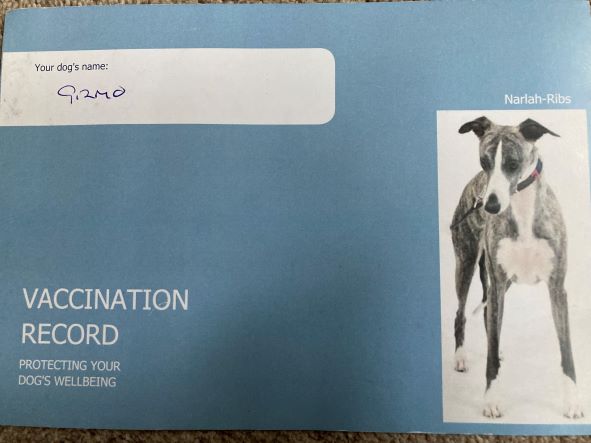This post contains affiliate links.
It can be nerve-racking to take your dog camping for the first time, as you are unsure how they will react. Whether you want to take a new puppy or a full-grown dog, there are some simple steps to take to help them feel settled. So you can all enjoy your holiday together.
How to prepare in advance for the first camping trip
Climatising your dog before your camping trip is essential, whether it’s a tent, caravan, motorhome or car camping. You can’t expect your dog to settle straight away on its first camping trip.
You will worry if your dog will disturb other campers, especially at night. Preparing in advance will ensure that your dog is at ease, above reducing the stress and any concerns.
| Prior action you can take | How will it help your dog |
|---|---|
| Back garden camping | Allow your dog to get used to seeing your tent Spend several nights sleeping in the tent with your dog Allow your dog to get used to noises outside at night. Sleep outside, so your dog gets used to outside night noised |
| Dog walking groups | Join local dog-walking groups, so your dog socialises with others. |
| Give your dog time | Don’t force your dog into your tent Allow your dog time to get used to the scent of your tent, as it will smell very strange. |
| Puppy classes | Attend puppy socialising groups |
| Dog training | Have complete control of your dog |
| Find a suitable campsite | Check to confirm that the campsite will accept dogs – there is often an additional charge per dog. Is there an area fenced-off so you can exercise your dog Not all campsites will accept dogs. Check the rules of the campsite before booking. Your dog breed listed under the Dangerous Dog Act 1991 |
| Stay local for your first trip | Camp within half-hour travel time from home for your first few camping trips. Keep trips short to allow your dog time to get used to the tent. |
| Time of year you are camping | Consider how your dogs’ health and well being will be during different camping seasons. Consider the temperature and how you can keep your dog cool or warm. |
| Is your dog healthy enough for camping? | If your dog has underlying health issues, it might not be worth the risk of taking them. Heart problems, dementia arthritis |
Camping in the back garden: Allow your dog time to get used to your tent
Setting up camp in your back garden is a great way to start giving your dog a chance to get used to your tent and outside noises during the night.
About two months before your trip, allow your dog to be with you when you pitch your tent and pack it away. Your dog will get used to the hustle and bustle that goes on whilst you are doing this.
After pitching the for the first time, allow your dog to sniff around to get used to the scent.
Please don’t force your dog to enter your tent, as it will scare them. You want your dog to feel safe secure the first time.
If you use your standard tent, it will already have your scent inside. However, if you are setting up a new tent, lay personal some items inside and outside so your dog can catch your scent.
Keep a watch that they do not wee anywhere on your tent. It will be a nightmare to get rid of the smell. Plus, you do not want your dog to lift their leg and wee on another persons’ tent. It will be an expensive bill.
Once your dog is used to seeing your tent, they will become curious and enter. Spend some nights sleeping in your tent with your dog so they get used to sleeping on their bed or snuggling up to you.
For us pitching and packing away our tent can be stressful and never run smoothly. Stress levels can be high, which your dog will sense and make them restless.
Stay local for your first trip with your dog
The first trip with your dog will give you an idea of how your dog will react and what you need to do in the future to make them more comfortable on longer trips.
It can be nerve-racking, as it is different from camping in the back garden. If your dog starts getting restless and barking, you can’t just take them back inside your house. There are more strange noise, other dogs and lots of people around.
Try to book a quiet dog-friendly site within about a 1/2 hour’s drive from home for one night. Gradually increase the nights depending on how your dog is settling.
Your dog may take a few short trips to become comfortable camping.
If your first trip turns into a disaster, don’t give up. Keep going, as it is excellent camping with your pets.
You will need to take some items on your first trip, even if it is for just one night. We will all remember the food and bedding, but you must consider other items such as medication, fencing or dog lead stakes, and sheltering your dog. Our article 21 things for your dog walks you through these items and explains alternatives so you do not spend money unnecessarily.
Will your dog listen to you?
90% of campsites have strict rules about keeping dogs on leads. However, dogs are great escape artists, especially from tents or barriers around your pitch area.
It is so easy for dogs to become distracted where ever you are. Camping is no different. There are new scents and sounds. They are like children, curious about their surroundings and wanting to explore. They will not understand restrictions as they will be accustomed to freedom at home.
Having complete control of your dog is essential. You don’t want them chasing after kids or dogs on-site or entering other people’s tents, which has happened in the past.
Another thing to consider is when you are out and about for the day, control is crucial. So many dogs go missing in strange areas. However, this can happen to obedient, fully-trained dogs. Once they have a scent, they can be off in seconds.
Basic commands for your dog:
- Stay/sit
- Stop/wait
- Heal on lead – without pulling
- Quiet – to avoid barking at sounds at night
If you do not feel confident in controlling your dog, take time out and train in your back garden. Or find a local dog training group and attend.
We had a dog in the past that was very reactive. If Bertie saw anybody whilst we were walking, he would want to run up to them and jump up to say hello. He would never hurt anybody, but this can be scary for younger children.
Socialising your dog before your trip
Dogs must be socialised to avoid barking at other dogs and people and understand acceptable behaviour. Nobody wants their dog to disturb other campers or worry about their behaviour. It can ruin a holiday.
Join local dog-walking groups on Facebook. It gives your dog a chance to meet others and not react. Many dogs have not had the opportunity to socialise due to covid restrictions, affecting how they interact with others.
Puppy socialising clubs
Puppy classes are a great way to start socialising early. It helps you bond with your puppy, understanding how they react to others and basic training techniques.
It will give you insight into how they may react later, especially camping. You will have a greater understanding of your puppies’ likes and dislikes.
It also gives you a chance to speak to other puppy owners, What they have found challenging and easy, so you do not feel overwhelmed.
The trainer can help with any potential behaviour issues and help you avoid or stop them. Before starting any puppy training groups, your pup must have had their first vaccination and wormed before attending.
Finding a campsite for dogs
Not all campsites accept dogs. About 90% of campsites will take dogs due to the increase of people wanting to camp with their four-legged friends. Larger campsites provide additional exercise areas for your dog to run freely.
However, some campsites have specific areas or fenced-off pitches for you and your dog. These areas are great as you do not need to worry about taking additional fencing or staking the dog lead. So they can’t escape.
You must check the campsite rules for each site, as they may all differ.
Rules of campsites that accept dogs
- Must remain on the lead at all times
- Pick up any dog poo
- Must not be classed as a dangerous dog under the Dangerous Dogs Act 1991
- Lead no longer than 2m
- Not left in the tent or on-site on their own at any time
- Not allowed in toilet or shower block
If you are camping on a family-run campsite, they may have other animals, such as chickens and horses. So if you have a reactive dog, it may be best to avoid these.
Consider the time of year you are camping
Dogs are affected by temperatures the same as we are. If your dog can’t cope with the heat, reconsider not taking them camping during peak summer temperatures. Dogs can get heatstroke the same as us, and it can kill them. They can also feel the cold the night, although not as much as we do.
If camping during the warmer season, have a way to cool your dog down and a shaded area for them to sit quietly. Cool pads are great for your dog to lay on, but check if the campsite has facilities for you to keep it cool. Pack water in your cool box so they always have cold water to drink.
Are you aware of the signs of heatstroke in your dog? If you are not, read Dogs in the sun article. It explains how different temperatures affect your dog and the signs you need to look out for.
During the colder season, they will feel the cold. A raised dog bed or a 3/4 R-rated sleeping pad placed underneath the bed or crate will help stop the cold from seeping through to the body.
Sleeping pads can be expensive, but if your dog has a comfortable night’s sleep, it is worth it. If you don’t want to buy a sleeping bag and have a small dog, a small enclosed cat bed will be a great way to make them feel snug and warm.
Is your dog healthy enough to go camping?
We all assume that our dog is in good health and will cope with camping. However, that is not always the case. Like us, they have underlying health problems that can either show whilst we are camping or aware of prior. You will probably be mindful of your dogs’ health, but have them checked over at a local vet to be safe.
If your dog has medical problems, include any medication they may need or medical issues on the name tag. Keep any medication in a pillbox that has a section per day. It’s a great way to quickly check that you have given them their tables, as it can be easy to overlook when camping.
If they have arthritis, the cold will make it a very uncomfortable holiday, especially if you are camping during spring or late autumn. Although British summer is not always that warm, fine drizzle seeps into the bones and aggravates problems.
During our camping trip earlier this year, an older couple had a dog that was nearly blind and also had dementia. It was great that the family wanted their dog on holiday. However, the dog kept wandering off, and the owners had no idea where he was half the time. Although this should not stop you from taking your dog for his safety, he should have been restricted to their pitch area and with somebody at all times.
Our dog Gizmo, who has sadly passed, had a severe heart murmur, so for us to take him camping was not an option, especially during sweltering weather. Being inside a tent would not have helped with his breathing or the direct heat outside. Even though we wanted to take him with us, we had to leave him at home for health reasons.
Ensure your dog is fully vaccinated

Vaccinations protect your dog from canine distemper, parvovirus, and canine hepatitis. Other dogs and wild animals can pass on these diseases. While camping, you are out in the countryside and visiting areas you usually would not visit. So it is crucial to have your dog vaccinated.
It is not the law in the UK but recommended that from 4-6 weeks and 12-week-old puppies need vaccination. Followed by yearly boosters.
If you doubt having your dog vaccinated, read the sad story of Nell, who was a tiny puppy with parvovirus and giardia. Although the article is about puppy farming, it does explain what your dog may go through as a result of opting not to vaccinate.
Why should your dog be microchipped?
Having your dog microchipped will help you to find him if he runs away due to a scare or wonders off. When camping from your home in a strange area, there is a greater chance your dog can go missing.
Microchipping your dog is compulsory in the UK. The vet injects the microchip into the back neck, ideally when they are young. The chip is numbered and provides all your contact details. It is vital to keep contact up-to-date. If your dog goes missing, vets or dog shelters should scan your dog and trackback to yourself.
The fee is under £20, but prices will vary depending on your vet’s fees. The higher premium will include sending details to lost pets sites, posters, and additional contact details if you are on holiday.
We usually use Petlog, which is very easy to use. However, in the past, we have used Identibase, but it was difficult to use and changing contact details was a nightmare. Depending on the vet will determine the microchip company they use.
Microchips can move, so when you visit your local vets, ask them to check it can still be read. Not all vets will check unless you ask them to scan your dog. You can buy a scanner if you do not want to do this.
Your dog is more likely to get worms whilst camping
Whilst camping, you explore the countryside and forests, which you probably do not do every day when you are home. So keeping your dog wormed is very important for their health.
Worming medication will stop your dog from becoming sick later, passing it on to other dogs and humans in some cases. They can pick worms from eating other animal stools like foxes and rabbits. Larva from the soil that sticks to the fur and paws, and your dog will lick to try to clean themselves.
I will always have the vets prescribe worming tablets, depending on their weight and age. It’s not pleasant but needs to be treated regularly with a solid edible tablet from the vet.
Tablets are from 3 months, and the edible chewable tablet is 6 months. I prefer the chewable table (Drontol) for our dogs as it has a beefy smell, and they seem to enjoy it.
Flea and tick treatment will help keep your dog safe in the countryside
Ensure your dogs’ flea and tick treatments are up to date. Wondering around the wilds with your dog, they will get fleas, or a tick will attach themselves. If your dog has fleas, they will lay eggs, and in no time, you will need to fumigate your home and camping gear.
There are so many different types of flea and tick treatments available. I don’t recommend buying off the counter as they have not worked for me in the past. If you join Pet Healthcare, they will be provided for you and be the correct measurement for your dog’s weight and age.
A cheaper way to vaccinate and microchip your dog for camping?
Vets provide the chance for people to join Pet Health Care Club. A monthly DDR payment covers vaccinations, worming, flea treatment, two health checks per year, discounts of medications, and nail clipping per year.
Depending on your dog’s size, prices will vary, but you can save between £190 – £220 per year. It s a great way to help spread the costs of vet bills and not worry about finding the money to pay for vaccinations. Plus, you receive text reminders of vaccinations, flea and worming medication.
I have always joined pet healthcare for both cats and dogs. As life takes over and time passes. Plus, the comfort of having two health checks per year included for me was ideal for our dog Gizmo due to his bad heart.
Key takeaway
- Camp in your back garden with your dog
- Short overnight trips to start local to home
- Consider the time of year
- Keep your dog vaccinated, wormed and flea treatment up to date
- Is your dog under control – do they need additional training
- Is your dog healthy


